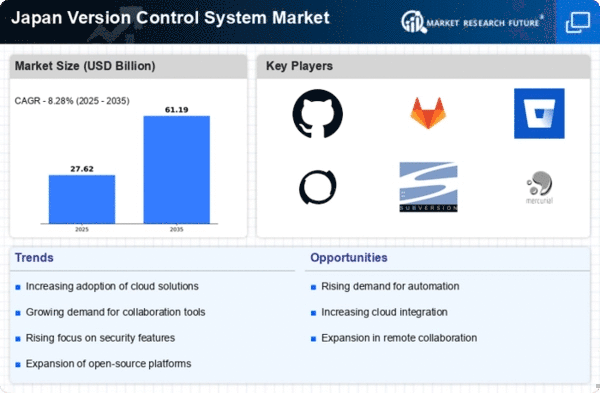Rising Demand for Collaboration Tools
The version control-system market in Japan is experiencing a notable surge in demand for collaboration tools. As organizations increasingly adopt remote and hybrid work models, the need for effective collaboration solutions has become paramount. This trend is reflected in a reported growth of approximately 15% in the adoption of collaborative software tools among Japanese enterprises. Version control systems facilitate seamless collaboration among developers, allowing for real-time updates and efficient project management. The integration of these systems into daily workflows enhances productivity and reduces the likelihood of errors, thereby driving the overall growth of the version control-system market. Furthermore, the emphasis on teamwork and collective problem-solving in software development is likely to continue propelling this demand, as companies seek to optimize their development processes and improve project outcomes.
Emergence of Agile Development Practices
The version control-system market in Japan is being shaped by the emergence of agile development practices. Agile methodologies emphasize iterative development, flexibility, and rapid response to change, which necessitate the use of effective version control systems. As organizations transition to agile frameworks, the demand for tools that support these practices is increasing. Reports suggest that around 60% of Japanese software development teams have adopted agile methodologies, leading to a corresponding rise in the utilization of version control systems. These systems provide the necessary infrastructure for managing code changes in fast-paced environments, enabling teams to collaborate efficiently and adapt to evolving project requirements. The alignment of version control systems with agile principles is likely to continue driving their adoption, as companies seek to enhance their responsiveness and innovation capabilities.
Regulatory Compliance and Data Governance
The version control-system market in Japan is increasingly influenced by regulatory compliance and data governance requirements. As organizations face stricter regulations regarding data management and software development practices, the need for effective version control systems becomes more pronounced. These systems play a crucial role in ensuring that code changes are documented, traceable, and compliant with industry standards. Recent surveys indicate that approximately 55% of Japanese companies prioritize compliance in their software development processes, highlighting the importance of version control systems in meeting these requirements. The growing emphasis on data governance is likely to drive the adoption of version control systems, as organizations seek to mitigate risks associated with non-compliance and enhance their overall data management strategies.
Growing Investment in Software Development
Japan's version control-system market is benefiting from the growing investment in software development across various sectors. As industries increasingly recognize the importance of digital transformation, there is a marked increase in funding for software projects. Recent statistics indicate that software development expenditures in Japan have risen by approximately 12% over the past year. This influx of investment is likely to drive the demand for version control systems, as organizations seek to implement robust development practices and ensure efficient project management. The integration of version control systems into software development workflows is essential for maintaining code quality and facilitating collaboration among development teams. As companies continue to allocate resources towards enhancing their software capabilities, the version control-system market is poised for sustained growth.
Increased Focus on Software Quality Assurance
In Japan, the version control-system market is significantly influenced by the heightened focus on software quality assurance. As businesses strive to deliver high-quality software products, the role of version control systems becomes increasingly critical. These systems enable developers to track changes, manage code versions, and ensure that only the most stable versions are deployed. Recent data indicates that approximately 70% of Japanese software companies have implemented version control systems as part of their quality assurance processes. This trend underscores the importance of maintaining software integrity and reliability, which is essential in a competitive market. The growing awareness of the need for robust testing and validation processes is likely to further drive the adoption of version control systems, as organizations recognize their value in enhancing software quality and reducing time-to-market.
















